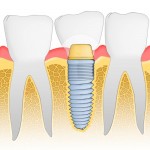
The aim of this study was to see whether the provision of simple mandibular implant overdentures (IODs) to elderly individuals would give them a significantly better nutritional profile than those who receive complete dentures (CDs).
The authors randomised two hundred fifty-five edentate patients over 65 yrs were to receive maxillary CDs and mandibular IODs (n = 128) or CDs (n = 127).
The outcome measure were blood plasma levels of homocysteine (tHcy), vitamin B12, vitamin B6, albumin, serum folate, and C-reactive protein concentrations and dietary intake were recorded at six-month and one-year post-treatment ,
They found
- The association between treatment and tHcy levels was not statistically significant.
- A decline of folate from baseline values as well as those of vitamins B6 and B12 and albumin was observed in both study groups.
- Significant between-group differences were detected in food preparation and in the individuals’ ability to chew a variety of foods.
The authors concluded that
This study suggests that implant overdentures do not have a more positive effect on the nutritional state of elderly edentate individuals at 6 and 12 months post-treatment than new complete dentures. However, those wearing IODs are significantly more likely to take in their nutrients through fresh, whole fruits and vegetables.
Awad, M. A., Morais, J. A., Wollin, S., Khalil, A., Gray-Donald, K., Feine, Implant Overdentures and Nutrition: A Randomized Controlled Trial. Published online before print September 27, 2011, doi: 10.1177/0022034511423396 JDR September 27, 2011 0022034511423396
